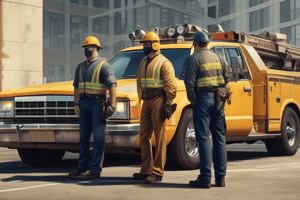Podcast
Questions and Answers
What must an employee do immediately after sustaining an injury while on duty?
What must an employee do immediately after sustaining an injury while on duty?
- Complete an Incident Report before notifying anyone.
- Notify the department head within 48 hours.
- Notify their supervisor or designee and the Worker’s Compensation Vendor. (correct)
- Report to the nearest hospital for immediate treatment.
What is the consequence of not following the proper injury reporting procedures?
What is the consequence of not following the proper injury reporting procedures?
- The employee will not be eligible for additional work-related benefits.
- Employees may face disciplinary action from the department.
- The incident will be overlooked and not recorded.
- Employees will be held personally responsible for medical costs. (correct)
Which form needs to be completed for any work-related injury or illness?
Which form needs to be completed for any work-related injury or illness?
- Employee Medical Release Form.
- Incident Report Form (OPD Form 189)
- Motor Vehicle Accident Report (DR-Form-40)
- NWCC Form 1, Investigation Report for Occupational Injury or Illness. (correct)
When should work comp forms be completed after an injury or illness occurs?
When should work comp forms be completed after an injury or illness occurs?
If an officer is injured during a motor vehicle crash while on duty, which report must they be included in?
If an officer is injured during a motor vehicle crash while on duty, which report must they be included in?
What should an employee do if an Incident Report is needed following an assault?
What should an employee do if an Incident Report is needed following an assault?
Who is responsible for sending the original work comp reports to the employee's immediate supervisor?
Who is responsible for sending the original work comp reports to the employee's immediate supervisor?
What additional report is not required if an employee is injured but did not experience an assault?
What additional report is not required if an employee is injured but did not experience an assault?
What must be done when more than one officer is assaulted?
What must be done when more than one officer is assaulted?
Who is responsible for notifying the injured employee’s Captain when an employee is critically injured?
Who is responsible for notifying the injured employee’s Captain when an employee is critically injured?
What form should be completed for police equipment damage?
What form should be completed for police equipment damage?
Before notifying an Emergency Contact of an injured employee, what must be obtained?
Before notifying an Emergency Contact of an injured employee, what must be obtained?
In the case of major injuries, how is an Emergency Contact typically notified?
In the case of major injuries, how is an Emergency Contact typically notified?
What should happen to medical care reports concerning the employee?
What should happen to medical care reports concerning the employee?
What is a duty of the Section/Precinct Captain after reviewing an employee's injury?
What is a duty of the Section/Precinct Captain after reviewing an employee's injury?
What occurs if an employee's injury is not within policy?
What occurs if an employee's injury is not within policy?
What should be done if an employee with major injuries cannot use the phone?
What should be done if an employee with major injuries cannot use the phone?
Who is NOT typically involved in the supervisory review process?
Who is NOT typically involved in the supervisory review process?
If the Emergency Contact lives far away, what should be done?
If the Emergency Contact lives far away, what should be done?
What must be included in the notifications upon an employee's serious injury?
What must be included in the notifications upon an employee's serious injury?
What is the role of a police Chaplain during the notification process?
What is the role of a police Chaplain during the notification process?
What should employees do if they require urgent emergency medical attention?
What should employees do if they require urgent emergency medical attention?
If an employee sustains a non-urgent medical emergency after hours, what should they do?
If an employee sustains a non-urgent medical emergency after hours, what should they do?
What is required before an employee seeks treatment for a believed injury during physical therapy?
What is required before an employee seeks treatment for a believed injury during physical therapy?
What must be completed every time an employee is seen by a physician for a work-related injury?
What must be completed every time an employee is seen by a physician for a work-related injury?
What does the Employee Resource Sergeant need to do when an employee is off work for more than two weeks?
What does the Employee Resource Sergeant need to do when an employee is off work for more than two weeks?
What happens to specialty pays when an employee is not working due to injury?
What happens to specialty pays when an employee is not working due to injury?
What should an employee do if they are released for Light Duty after an injury?
What should an employee do if they are released for Light Duty after an injury?
For an injury to be recognized as duty-connected, what must be adhered to?
For an injury to be recognized as duty-connected, what must be adhered to?
According to the Worker’s Compensation provisions, who is responsible for contacting the Worker’s Compensation Coordinator after an injury?
According to the Worker’s Compensation provisions, who is responsible for contacting the Worker’s Compensation Coordinator after an injury?
Which type of incidents are considered individually for duty-connected designation?
Which type of incidents are considered individually for duty-connected designation?
In relation to additional benefits, which act is associated with the eligibility inquiries for officers?
In relation to additional benefits, which act is associated with the eligibility inquiries for officers?
What is a critical aspect of maintaining the employee’s medical file?
What is a critical aspect of maintaining the employee’s medical file?
Who holds the responsibility to submit the completed work status report to the Worker’s Compensation?
Who holds the responsibility to submit the completed work status report to the Worker’s Compensation?
Flashcards
On-Duty Injury Reporting
On-Duty Injury Reporting
Omaha Police Department employees must report any injury or illness sustained on duty, even if it doesn't require immediate medical attention.
Initial Injury Notification
Initial Injury Notification
Injured employees must contact the city's contracted Worker's Compensation Vendor (WCV) immediately after an on-duty injury or illness.
NWCC Form 1
NWCC Form 1
This form is required for ANY work-related injury or illness, regardless of whether medical treatment is sought.
Work Comp Forms Deadline
Work Comp Forms Deadline
Signup and view all the flashcards
Motor Vehicle Crash Reporting
Motor Vehicle Crash Reporting
Signup and view all the flashcards
Assault Reporting
Assault Reporting
Signup and view all the flashcards
Employee Responsibility for Medical Costs
Employee Responsibility for Medical Costs
Signup and view all the flashcards
Incident Report Exception
Incident Report Exception
Signup and view all the flashcards
Victim Type on Report for Officer Assault
Victim Type on Report for Officer Assault
Signup and view all the flashcards
Chief's Report (OPD Form 214)
Chief's Report (OPD Form 214)
Signup and view all the flashcards
OPD Police Equipment - Accountability Form (OPD Form 24)
OPD Police Equipment - Accountability Form (OPD Form 24)
Signup and view all the flashcards
Notification Procedures for Serious Injuries
Notification Procedures for Serious Injuries
Signup and view all the flashcards
Emergency Contact
Emergency Contact
Signup and view all the flashcards
Emergency Contact Data Sheet
Emergency Contact Data Sheet
Signup and view all the flashcards
Minor Injury
Minor Injury
Signup and view all the flashcards
Major Injury
Major Injury
Signup and view all the flashcards
Supervisory Review of Injury Incidents
Supervisory Review of Injury Incidents
Signup and view all the flashcards
Line Investigation
Line Investigation
Signup and view all the flashcards
Internal Information Report (OPD Form 46)
Internal Information Report (OPD Form 46)
Signup and view all the flashcards
Notification of Emergency Contact
Notification of Emergency Contact
Signup and view all the flashcards
Police Chaplain
Police Chaplain
Signup and view all the flashcards
Officer Notification of Emergency Contact
Officer Notification of Emergency Contact
Signup and view all the flashcards
OPD Chaplaincy Program Policy
OPD Chaplaincy Program Policy
Signup and view all the flashcards
Urgent Medical Emergencies
Urgent Medical Emergencies
Signup and view all the flashcards
Non-Urgent Medical Emergencies
Non-Urgent Medical Emergencies
Signup and view all the flashcards
Injuries During Physical Therapy
Injuries During Physical Therapy
Signup and view all the flashcards
Follow-Up Medical Treatment
Follow-Up Medical Treatment
Signup and view all the flashcards
Work Status Report
Work Status Report
Signup and view all the flashcards
Employee's Duty Regarding Work Status Report
Employee's Duty Regarding Work Status Report
Signup and view all the flashcards
IOD Pay Approval
IOD Pay Approval
Signup and view all the flashcards
IOD Pay Requirement
IOD Pay Requirement
Signup and view all the flashcards
Extended Leave Notification
Extended Leave Notification
Signup and view all the flashcards
Duty Status Update
Duty Status Update
Signup and view all the flashcards
Light Duty Assignment
Light Duty Assignment
Signup and view all the flashcards
Light Duty Status Update
Light Duty Status Update
Signup and view all the flashcards
Injured on Duty Checklist
Injured on Duty Checklist
Signup and view all the flashcards
Return to Normal Duty
Return to Normal Duty
Signup and view all the flashcards
Study Notes
Omaha Police Department (OPD) Injury and Illness Procedures
- Immediate Notification Required: Employees must immediately notify their supervisor or designee of any on-duty injury or illness, or inability to perform work duties due to illness, injury, medical/dental care, or contagious disease exposure. Failure to follow procedure may result in personal responsibility for medical costs.
Notification Procedures
-
Worker's Compensation Vendor (WCV) Contact: The injured employee, aided by their supervisor or the Employee Resources Sergeant, must immediately contact the City's contracted WCV, regardless of whether medical attention is required.
-
Injury/Illness Documentation: Complete required worker's compensation forms (NWCC Form 1, Investigation Report, Notice of Employee's Right to Choose a Doctor) within 24 hours of the incident.
- Forms should be scanned/emailed to the Employee Resources Sergeant at [email protected].
- Originals also forwarded to the employee's supervisor for review.
-
Incident Reports: An Incident Report (OPD Form 189) is typically not needed unless the injury involves assault, a separate crime, chemical agent exposure, or a motor vehicle crash.
-
Motor Vehicle Crashes: Injury reports from motor vehicle crashes are included in the State of Nebraska’s Motor Vehicle Accident Report (DR-Form-40).
-
Assault Reports: Assault/attempted assault injury reports are documented on the Incident Report (and Booking Report, if applicable) with the "victim type" listed as "law enforcement officer". Separate forms for each officer involved. Chief's Report (OPD Form 214) may also be required.
-
Police Equipment Damage: Complete an OPD Police Equipment – Accountability Form (OPD Form 24) when police equipment is damaged.
Injury Classification and Notification
- Minor Injuries: Injured employee can notify individuals they choose; transportation may be provided to an Emergency Contact for treatment.
- Major Injuries: Defined as injuries preventing telephone use. Consent obtained from the employee (if conscious and rational) before notification. Emergency Contact is notified.
- Notification Methods: In-person notification (ideally by a Sergeant or higher rank, possibly with a Chaplain) is preferred when possible. Telephone calls are used when other arrangements are unfeasible. Non-emergency contacts are discouraged.
Supervisory Review
- Document Review: The employee's Lieutenant or manager reviews all documents (reports, videos, etc.) to determine if actions were within policy. Recommendation shared via Inter-Office Communication with the respective Section/Precinct Captain.
- Captain Review: The Section/Precinct Captain reviews the Inter-Office Communication and determines if the injuries were within policy.
- If not, policy violations are investigated (Internal Affairs or another investigation).
- Case File Inclusion: The Inter-Office Communication is included in the employee's Worker's Compensation Case File. Crucial data points (employee name, injury date) are to be included.
Treatment and Responsibilities
- Urgent Care: Injured employees needing immediate medical attention are transported to the nearest medical facility or trauma center (using the Rescue Squad, if needed).
- Non-Urgent Care: Employees with non-urgent injuries must contact the WCV before treatment to determine appropriate facilities.
- Physical Therapy/Work Hardening: Injuries during these activities are reported to the physical therapist and WCV.
- Follow-up Treatment: Contact WCV prior to follow-up medical care.
- Work Status Reports: Physician (or designee) to submit electronic work status reports to the WCV. Employee responsible to provide report to supervisor and Employee Resource Sergeant as well.
- IOD Pay: Employee Resource Sergeant contacts City's Worker's Compensation Coordinator for approval to enter IOD pay. A physician's note is required to support IOD compensation.
Temporary Duty (IOD or Limited Duty)
- More than 2 Weeks: Employee Resource Sergeant notifies the Police Personnel Unit (PPU) of status change. Applicable Contractual agreement considered.
- Deactivated Pays: Specialty pay, premium pay, and shift differentials are deactivated during temporary duty status outside of work assignment. These are reinstated at return to duty.
- Light Duty: Employees with Light Duty doctor's release will be considered for assignment with assistance from Employee Resource Sergeant.
- Return to Regular Duty: Employees return to regular duty hours after IOD or Light Duty. Collective bargaining agreement, seniority and related factors are considered.
Environmental Injuries
- Duty-Connected Issues: Heat reaction, foreign objects, and other environmental hazards are reviewed individually to determine duty connection based on the specific incident.
- Legal Precedent (Crow vs. Americana): This considers if there was a heightened employment risk versus a general public risk. Relevant Nebraska Court determination impacting employment risk vs employment conditions.
Additional Benefits
- Federal Employee's Compensation Act (FECA): Contact HR Department about eligibility for FECA benefits (5 USC 8101 et seq.).
- Supplemental Insurance: Contact Personnel Unit (PPU) for Injury on Duty leave documentation and supplemental coverage.
Studying That Suits You
Use AI to generate personalized quizzes and flashcards to suit your learning preferences.



